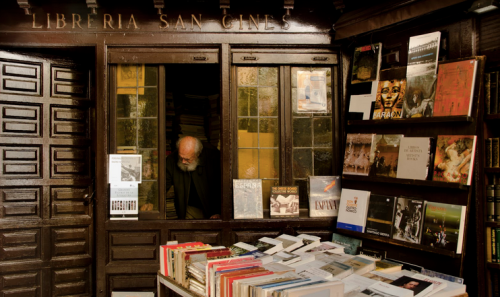San Gines Bookstore: a corner of Madrid where books are not bound by time
I have been in the bookshop of El Corte Inglés overlooking Madrid’s Plaza Puerta del Sol for half an hour, and I’m still looking for an old copy of Foucault’s Pendulum by Umberto Eco. I do not like to ask to employees; I love to walk among the shelves, feel the books, and choose by my own. Although surrounded by countless books accurately divided by category and author, I cannot feel at ease at all. The neon lights, the deafening noise of the crowd looking for books, the loudspeaker that interrupts my search every five minutes, and the stack of ebook readers that distracts me from real books, increases my distrust towards that department store. I am seized by a sense of suffocation. In a moment I am out of the mall, walking from the main square to the Arenal street.
A few meters from the bookshop of the shopping center, another reading’s book store appears in front of me. It is a little bookshop tucked away in a corner, next to the San Ginés church and very close to the oldest chocolateria of the city. Ancient-looking books are placed side by side on an old wooden counter. Behind, dark wooden shelves are full of books with bright colors and interesting titles. Among authors and writers’ forgotten ephemeral successes, ancient tomes, manuals crafts, popular collections, guides and other genres of secondhand books are here in a curious hodgepodge. The cheap price is what brings all together. I am feeling as if I were in the private library of a very interesting person with a long story.
San Gines Bookshop, this is the name of this magic place. Its owner is a man with a long white beard and an aspect as old as the books he sells. I asked him about the history behind his small business. He told me that nobody knows exactly the date of its opening. Through his tale, I learned that there was already news of this book stand in the press in 1805, but it is probably earlier. In 1899 Madrid City Council granted the license for the bookshop to a Spaniard called Francisco Irawedra. Later, in 1922, the owner of the bookstore became Antonio Sánchez, and twelve years later the same business was renamed Rubiños Bookseller. Then it passed to the nice old man with the white beard in front of me. I have just asked him for the book I am searching for, when a young Latin American interrupts us. He asks the owner about the price of an old manual of journalism and a scientific book about all possible uses of drugs. “Curious combination,” I think. Meanwhile a group of Americans approaches the wooden counter, driven by curiosity for that little book’s world in the middle of the street. They look, take some pictures, and continue their trip throughout Madrid. Tourists and locals seem to ignore the history behind that man and its bookshop.
Waiting for the old man, I gently touch books, and I choose one with the cover worn by time. It’s like holding an antique. “It is the contact with the book that is missing,” says the young Latin American to the owner. He has read my mind.
Nowadays everything is digital, even books. Fewer people are willing to invest money in reading, especially if they have the possibility to download the same lecture in digital format at an affordable lower price, if not for free. The economic crisis has increased this trend and forced many traditional booksellers to close their doors, some of them real book’s museums. The example of Rumor, a very famous bookshop opened since 1975 and forced to close at the end of last year, was the most recent last example of this phenomenon, and which shook the cultural circle of the Spanish capital. It is a sad reality, but not so dark as it may seem. Every Spaniard eager to rediscover the taste of the traditional book knows that can still found places far from modernity in a hidden corner of Madrid: places stuck in the past, dominated by the slight rumor of the culture. Old-fashioned places, where there is no need tablet or ebook readers. San Ginés’ bookshop is one of these.
The old man with the white beard interrupts my thoughts, handing me an old book. I take a look to it and I smile. Once paid and thanked that curious character, I walk away from the library holding an old copy of the Umberto Eco’s book, probably the cheapest one in the market: it only cost me three euros.

I have already been in this place, when I first arrived in Madrdu. Yes, I agree, it is magic. Great post!
Thank you! It’s one of my favorite place in Madrid 🙂